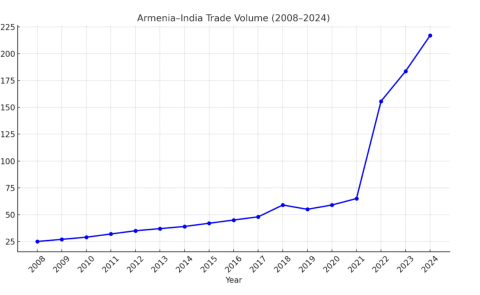
Georgia’s role in China’s ‘Belt and Road Initiative’ might increase

Over the past several months there have been a number of interesting economic and political developments which could signal a new development in Georgia-China relations and the fate of the South Caucasus corridor.
Since 2013, when the ‘Belt and Road Initiative’ (BRI) was announced by the Chinese president, both Georgian politicians and analysts have been quite enthusiastic about the prospects of the country's involvement in the BRI.
What was rarely if at all mentioned was the fact that BRI in fact did not include the South Caucasus route among its major five trade corridors. Indeed, the Russian, Central Asian and Iranian/Pakistani routes are far more efficient (because of the lack of geographic barriers) and much larger in economic scope than that of the South Caucasus.
However, Chinese moves in Georgia over the past year or so could signal a shift in approach to the South Caucasus corridor (which includes not only roads and railways, but also Georgia's Black Sea ports) and its potential inclusion in the BRI.
Perhaps a good representation of this increased attention to Georgia is the first visit by a Chinese minister of foreign affairs in nearly 23 years this past May. It is interesting that the visit took place during the heightened tensions around the faltering Anaklia port, when the US and the European countries voiced their concern over the implementation of the project and there were fears of complete Western withdrawal from the port.
Moreover, there is also a marked increase in Chinese attention to the Georgian railways within the BRI. For instance, it was reported in early November that a train from China went through the South Caucasus corridor to reach Europe in approximately two weeks using the 826-kilometer Baku-Tbilisi-Kars railway. It is a notable development as it was a first such attempt since the railway opened in 2017. For the Chinese, the railway will play an important role in connecting the Black and Caspian Seas as it is supposed to transport up to 8 million tons of cargo by 2025.
This September Tbilisi hosted the Silk Road Forum. Though being the third consecutive event and organized by the Georgian government, this year’s ‘Forum’ stands out as more than 2000 delegates attended, and much attention was paid by the Chinese media as well as politicians. Numerous potential Chinese investors also visited Tbilisi.
But the Chinese are not only looking at the railways. Recently it was reported that Chinese businessmen from Chinese-led business associations and the mobile operator China Unicom held meetings in Georgia’s breakaway Abkhazia. The sides discussed establishing a special trade zone to produce cell phones (back in 2015, China Railway also signed a memorandum in Moscow on restoring Abkhazia’s railway, but the project did not work out).
Though the news caused grievances in Georgia and Tbilisi demanded an explanation from the Chinese embassy, it is unlikely, as some analyst suggested, the bilateral relations would be compromised. Still, for Tbilisi the economic cooperation with the Chinese is important as it could serve as a certain balance in the future against Russian pressure. For the Chinese, antagonizing Tbilisi will complicate any future plans for expansion of Chinese presence at the Black Sea. Nevertheless, the visit to Abkhazia overall fits well into increased Chinese interests in Georgian ports and generally the Black Sea shore as an interconnection point with the EU market.
Still, it is interesting what could have caused such a gradual change in Chinese perspective towards Georgia. One of the reasons lies in the fact that the BRI has never been a static project, but rather a constantly evolving initiative. Like ancient and medieval trade routes running across Eurasia, the BRI nowadays responds to various rising security challenges and adapts to new opportunities. From this perspective, Georgia's and the South Caucasus corridor's omission from the initial trade corridors does not preclude the region from becoming a vital part of the BRI. The Anaklia port, Baku-Tbilisi-Kars railway and similar projects are increasing Georgia's positioning as a potential BRI transit state.
Nevertheless, there remain obstacles in transforming Georgia into a full-scale benefactor of the BRI. Trade between China and Georgia has not grown as expected despite the China-Georgia free trade agreement signed in 2015. For instance, in 2018 trade turnover between the countries increased by only 10%, compared to a 29% increase in 2017. Moreover, by 2019 there is not much evidence of Chinese companies creating jobs for Georgians. Less investment was made by the Chinese in infrastructure construction across Georgia.
Moreover, Russian factor still plays a role. The Chinese are careful about their moves in Georgia and the South Caucasus in general. Regarded as Moscow's sphere of influence, Beijing will withhold from any moves that could cause fears in Moscow. Still, China-Russia increasing partnership against US moves in Eurasia is far more important geopolitically for both countries than to undermine it in the South Caucasus.
Nevertheless in the long run, Moscow has much to worry. True, Chinese economic interests in the South Caucasus are not as big, for instance, in Central Asia, but there is still a clear trend of Chinese policies aiming to increase its economic presence in the region and Georgia specifically.
There is also the US factor that could limit Chinese moves. In the age of increasing US-China competition for the control over trade routes, vital ports and other infrastructure across Eurasia, there will be a significant pushback for the Chinese moves from Washington.
Thus there is an increased Chinese attention towards Georgia. This is not necessarily reflected in the economic sphere, but generally in political moves over the past several months. Though China will remain generally cautious in their policies towards Georgia not to cause concerns from Moscow and a pushback from the US, Beijing will nevertheless continue building closer partnership with Tbilisi.
Emil Avdaliani specializes on former Soviet space and wider Eurasia with particular focus on South Caucasus and Russia's internal and foreign policy, relations with China, the EU and the US. He can be reached at emilavdaliani@yahoo.com.
See Also


Armenia and India: Building New Bridges in Trade and Strategy

Between Tehran and Tel Aviv: Azerbaijan’s Neutrality Dilemma Amid Rising U.S.-Israel Tensions with Iran

From Neorealism to Neoliberalism: Armenia’s Strategic Pivot in Foreign Policy After the Nagorno-Karabakh Conflict

Georgia and Russia: New Turn in Bilateral Relations

